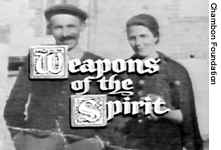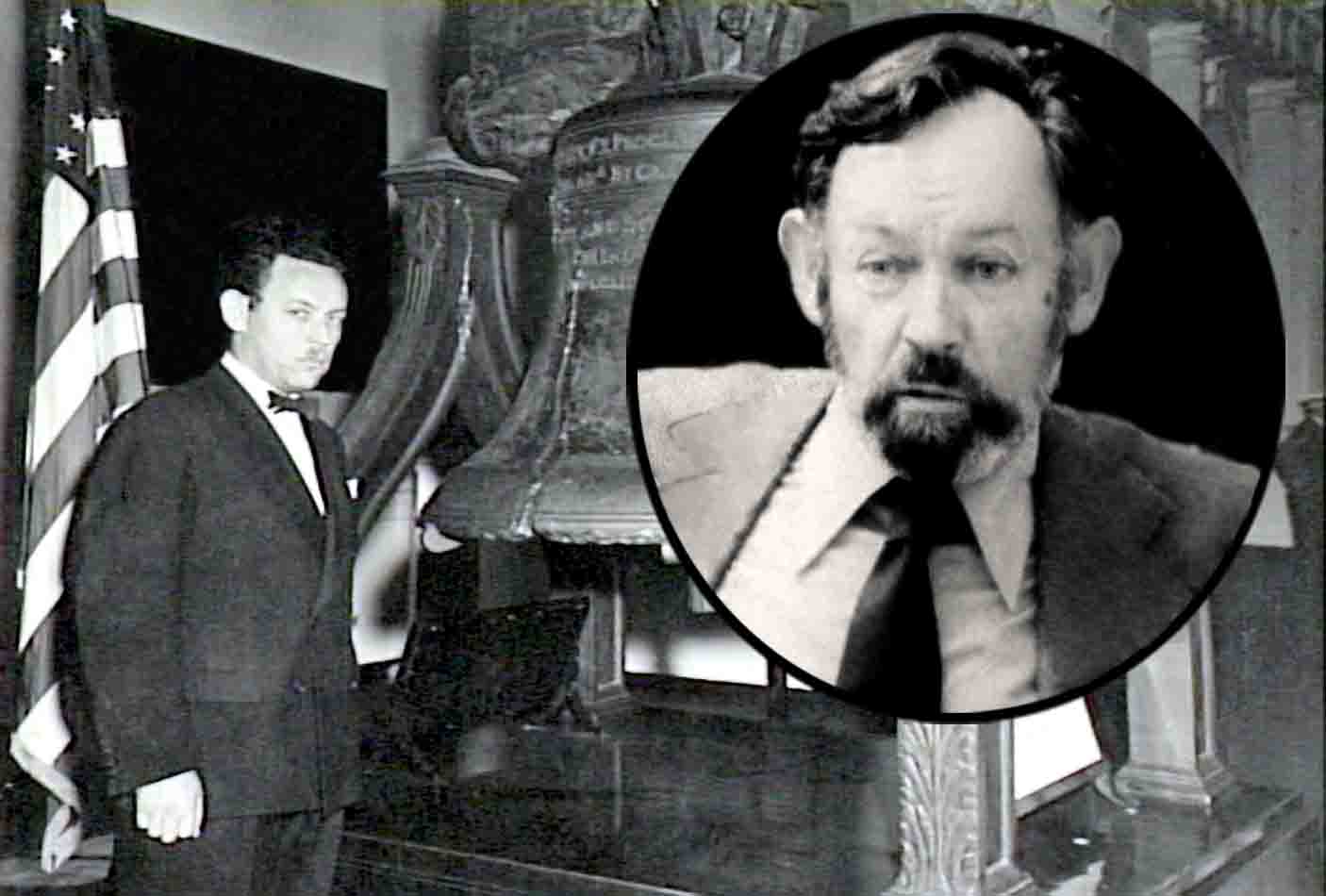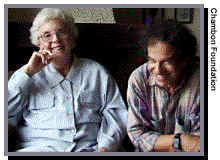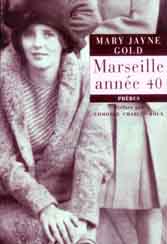

[Varian Fry Institute] [Chambon Foundation Home] [Chambon Institute Home]


PIERRE SAUVAGE
 Pierre Sauvage
is a child survivor of the Holocaust and a child of Holocaust
survivors (at right in the arms of
Eva Héritier of Le Chambon).
An Emmy Award-winning
documentary filmmaker, Sauvage is the President of the
Chambon
Foundation, which he founded in 1982. The Chambon Foundation was the
first nonprofit educational
foundation committed to exploring and communicating the necessary and
challenging lessons of hope intertwined with the Holocaust’s unavoidable
lessons of despair. In 2005, the
Varian Fry Institute was
established as a division of the Chambon Foundation.
Pierre Sauvage
is a child survivor of the Holocaust and a child of Holocaust
survivors (at right in the arms of
Eva Héritier of Le Chambon).
An Emmy Award-winning
documentary filmmaker, Sauvage is the President of the
Chambon
Foundation, which he founded in 1982. The Chambon Foundation was the
first nonprofit educational
foundation committed to exploring and communicating the necessary and
challenging lessons of hope intertwined with the Holocaust’s unavoidable
lessons of despair. In 2005, the
Varian Fry Institute was
established as a division of the Chambon Foundation.
 Sauvage
(at left in 1990 with Le Chambon righteous Marie Brottes and Henri Héritier) is best known for his 1989-2017 feature documentary
Weapons of the Spirit, which tells the story
the conspiracy of goodness of a mountain community in
France that defied the Nazis and took in and saved five thousand
Jews, including Sauvage and his parents. Sauvage himself was born in this unique
Christian oasis, Le Chambon, at a time when much of his family
was being tortured and murdered in the Nazi death camps. But it
was only at the age of 18 that he learned that he and his family
were Jewish and survivors of the Holocaust.
Sauvage
(at left in 1990 with Le Chambon righteous Marie Brottes and Henri Héritier) is best known for his 1989-2017 feature documentary
Weapons of the Spirit, which tells the story
the conspiracy of goodness of a mountain community in
France that defied the Nazis and took in and saved five thousand
Jews, including Sauvage and his parents. Sauvage himself was born in this unique
Christian oasis, Le Chambon, at a time when much of his family
was being tortured and murdered in the Nazi death camps. But it
was only at the age of 18 that he learned that he and his family
were Jewish and survivors of the Holocaust.
Weapons of the Spirit
won numerous
awards, including the prestigious DuPont-Columbia Award in Broadcast
Journalism (sharing the documentary award with Ken Burns’The
Civil War series). The film received two national prime-time
broadcasts on P.B.S., accompanied by Bill Moyers’ probing 1989 interview of the filmmaker, and
remains one of the most widely used documentary teaching tools on the Holocaust.
(On April 23, 2009, President Barack Obama publicly praised the the
righteousness of the villagers of the area of Le Chambon. Please see
www.chambon.org for further information.)

Late 2017 will see the release of his documentary short Not Idly By: Peter Bergson, America and Holocaust (left), as well as the DVD edition of Sauvage's 1979 Yiddish: the Mame-Loshn—"the mother tongue," pronounced mama-lushen—the Emmy-winning portrait of a unique and tenacious language and culture. Upcoming and long in post-production is And Crown Thy Good--Varian Fry in Marseille (right), a feature documentary about Americans involved in rescue in Marseille, France, after France fell to the Nazis. While celebrating some remarkable Americans—Varian Fry (right), Miriam Davenport, Mary Jayne Gold, Charles Fawcett, Leon Ball and Hiram Bingham IV—the documentary will place the story in the context of those challenging times, addressing American policies then towards the unwanted refugees.
Also in post-production are two other documentary shorts: We Were There: Franklin Littell Confronts the Holocaust, and Three Righteous Christians of France, which focuses on three Righteous Christians of France: Madeleine Barot, André Dumas, and Jean-Marie Soutou.

 Sauvage has also long had plans for a dramatic movie also dealing with the
Varian Fry
rescue
mission
but
based
on Mary Jayne Gold's flavorful memoir, Crossroads Marseilles 1940,
the rights to which the author willed to Sauvage. Mary Jayne Gold (left,
and right with Sauvage, during production of And Crown Thy Good),
a beautiful heiress, participated in
the mission, while at the
same time having
an affair with a
young
French
gangster. The book was published in France
in 2001 as Marseille Année 40 to
unanimous
acclaim, with Sauvage
contributing an afterward.
Sauvage has also long had plans for a dramatic movie also dealing with the
Varian Fry
rescue
mission
but
based
on Mary Jayne Gold's flavorful memoir, Crossroads Marseilles 1940,
the rights to which the author willed to Sauvage. Mary Jayne Gold (left,
and right with Sauvage, during production of And Crown Thy Good),
a beautiful heiress, participated in
the mission, while at the
same time having
an affair with a
young
French
gangster. The book was published in France
in 2001 as Marseille Année 40 to
unanimous
acclaim, with Sauvage
contributing an afterward.
 In
June 2004, Sauvage initiated and played a key role in organizing a "Liberation
Reunion"
(picture,
left) that took place in Le Chambon for the 60th anniversary of D-Day.
Sauvage's efforts contributed to French
President
Jacques
Chirac's decision to make a major address in Le Chambon on July 8,
2004. Shortly after his election as the new President of France, Nicolas
Sarkozy made time to view Weapons of the Spirit and called it "deeply
moving." The film has been officially recommended for use in the French school system.
Unfortunately, despite five years of efforts, Sauvage was not able to fulfill
his dream of helping to create a historical museum in the village; the farm that
could have served for this purpose was sold in 2008.
In
June 2004, Sauvage initiated and played a key role in organizing a "Liberation
Reunion"
(picture,
left) that took place in Le Chambon for the 60th anniversary of D-Day.
Sauvage's efforts contributed to French
President
Jacques
Chirac's decision to make a major address in Le Chambon on July 8,
2004. Shortly after his election as the new President of France, Nicolas
Sarkozy made time to view Weapons of the Spirit and called it "deeply
moving." The film has been officially recommended for use in the French school system.
Unfortunately, despite five years of efforts, Sauvage was not able to fulfill
his dream of helping to create a historical museum in the village; the farm that
could have served for this purpose was sold in 2008.
The son of prominent French journalist and author Léo
Sauvage, Sauvage was 4 when he and his
parents moved to New York City in 1948, returning to Paris at 18
to pursue his studies. After working briefly as a journalist like
his father, the Sorbonne drop-out fell in love with film at
Paris’ legendary Cinémathèque Française, becoming a film
scholar and landing a job there working for the legendary genius
Henri Langlois. Veteran émigré producer Otto Preminger brought Sauvage
back to New York as a story editor.
After co-authoring a two-volume
critical study of American film directors, American Directors, Sauvage finally got behind the camera himself as a staff
producer-reporter for Los Angeles public television station KCET.
While producing over 30 hours of varied programming, his first
major success came when he decided to begin exploring those
Jewish roots he’d never known in Yiddish: the Mame-Loshn. Sauvage lives in Los
Angeles. He and his wife, entertainment lawyer Barbara M. Rubin, have two children,
documentary filmmaker David Sauvage and Rebecca Sauvage.
A lecturer on the Holocaust and its continuing challenges for thirty years, Sauvage has been a student of what he has called the American experience of the Holocaust. His address Did Americans Fight the Holocaust? tackles this thorny subject, drawing notably on his current documentaries--and urging us to look in as well as out.
The subject is also woven into his video-accompanied presentation The Challenge To Us of Holocaust Rescuers. Sauvage has long been one of a pioneering handful of experts on rescuers of Jews during the Holocaust—"righteous Gentiles"—and contends that they still have much to teach us. Sauvage’s lecturing and public appearances, with and without Weapons of the Spirit or excerpts from his other works, are all under the Chambon Foundation/Varian Fry Institute's auspices and help supports their projects.
Texts and addresses by Pierre Sauvage
Public appearances by Pierre
Sauvage
[Varian Fry Institute] [Chambon Foundation Home] [Chambon Institute]
[email us] [contact information] [table of contents] [make a contribution?] [search] [feedback] [guest book] [link to us?]
© Copyright 2011, Chambon Foundation. All rights reserved. Revised: March 16, 2011